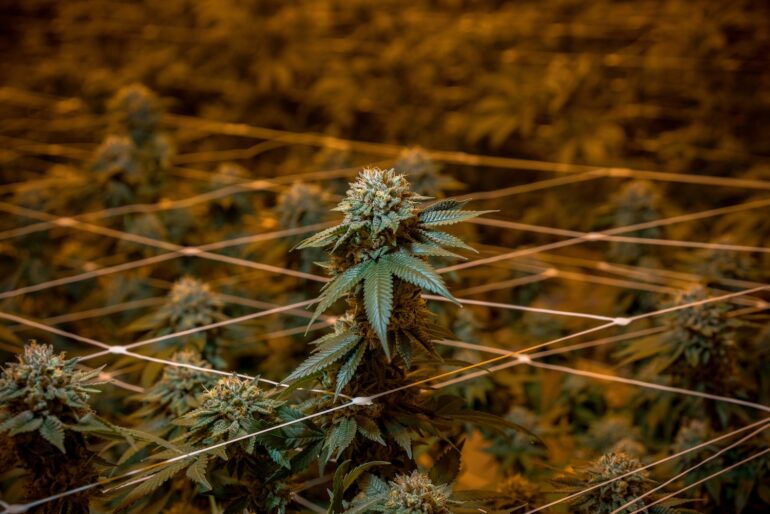A new report from the National Academies of Science, Engineering and Medicine (NASEM) takes a deep-dive into the intersection of cannabis policy with public health and social equity.
Alongside many recommendations for improving the social equity benefit and minimizing the public health impact of increasingly liberal cannabis policies, it also recommends that hemp be redefined in law so that “no form of [THC]” is exempt from the Controlled Substances Act.
About the report: The report is entitled “Cannabis Policy Impacts Public Health and Health Equity” and was commissioned by the Centers for Disease Control and Prevention (CDC) and National Institutes of Health (NIH), and stretches to over 300 pages. The report covers a lot of ground, including current policy and markets, public health issues, social equity and research priorities.
The report was commissioned by the CDC and NIH to recommend a “harm reduction approach” to cannabis policy and set a research agenda for the next five years. Unlike the previous NASEM report in 2017, this report focuses on the impacts of policy rather than the risks and benefits of cannabis itself.
The big picture: Cannabis policy is changing faster than the federal government can keep up with, and some of these changes come from the federal government itself.
Along with the 38 states (plus three territories and D.C.) that have medical marijuana programs and the 24 states with full cannabis legalization, the 2018 Farm Bill essentially brought cannabis (in low-THC “hemp” form) to every state in the country. This has led to many issues with poorly-regulated high-THC products being widely available, and even states with legal cannabis have diverse approaches to the challenges it presents.
Key recommendations: The report makes many recommendations, but most of these can be broken down into five key areas:
Regulatory standards: The report encourages the CDC and other agencies to conduct research into and develop best practices for public health focused regulation of cannabis in legal states. They suggest that this should draw on alcohol and tobacco policy, including marketing restrictions, age restrictions, taxation and measures to reduce impaired driving. The report also suggests states use US Pharmacopeia analytical standards for cannabis flower testing and that dispensary staff should be trained on key issues like the risks of cannabis and preventing sales to minors.
Surveillance: The report suggests monitoring and surveillance activity in two key areas. Firstly, public health surveillance focused on use patterns, product sales, health impacts, and cultivation, conducted by the CDC. Secondly, it suggests law enforcement regularly collect and publicly report data on which criminal enforcement tools they use for cannabis, including arrests, sentences, incarceration, and diversion programs.
Social justice and equity: The report suggests that states should “systematically” evaluate their cannabis social equity policies and revise them as needed to meet their goals and minimize unintended consequences. It also says policymakers should “meaningfully engage affected community members” when developing and revising these policies. In addition, it recommends that states that legalize or decriminalize cannabis should implement criminal justice reforms and automatically expunge or seal records of low-level cannabis offenses.
We spoke to Columbia University Professor Dustin T. Duncan, who worked on the report, who told us that, “Based on our work, it is clear that systems of accountability at multiple levels are needed, for systems to work as intended. I call this setting up ‘systems of success.’ While there have been efforts to promote equity via these social policy programs, it seems that systems of success have not been established from them to operate.”
Continuing, “For example, petition-based expungements can involve public hearings and fees, which may not be practical to the lives of vulnerable populations with a history of incarceration. As we show in the report, this significantly reduces the uptake of this equity focused intervention. Consequently, we recommended focusing on government-initiated or automatic record relief vs. petition-based relief.”
Professor Duncan concluded, “I cannot say that this or a single initiative will rectify social equity issues stemming from the war on drugs. However, it is a step in the public health and social justice right direction.”
Research: Health authorities, the CDC and NIH should focus research on:
- The public health outcomes of different approaches to cannabis regulation
- The efficacy of tests for cannabis impairment
- The health effects of cannabis use by specific populations
- The health effects of new cannabis products
- Reducing the risks of cannabis use
Crucially, they also point out that the Office of National Drug Control Policy should be allowed to study the impacts of cannabis legalization, which really seems like a no-brainer.
Public health campaigns: The report says that the CDC and other agencies should develop public health campaigns targeted towards vulnerable groups (such as young people, people who are pregnant and the elderly), as well as campaigns focusing on harm reduction strategies, the risks of combining cannabis and alcohol and other issues such as the risks of high-potency products. Dispensary staff training would be part of this too.
Hemp with zero THC? One of the few concrete policy suggestions is that Congress should redefine “hemp” so that it’s clear that “no form of [THC] or semisynthetic cannabinoid derived from hemp is exempt from the Controlled Substances Act.” They don’t go into much detail on this, but if THC had to be reduced to undetectable levels, this would be a substantial hit to the hemp industry. It would increase production costs, remove all full-spectrum hemp products and likely have no tangible benefit, since research suggests no effect from doses below 2.5 mg.
What’s next? Overall, the report offers many good suggestions for improving cannabis policy, and while we see the hemp recommendation as a misstep, there is a lot of value in the report. The core lesson – that we need more research into the impacts of cannabis policy and that states need to take more steps on equity – is one that lawmakers and researchers should take to heart.
